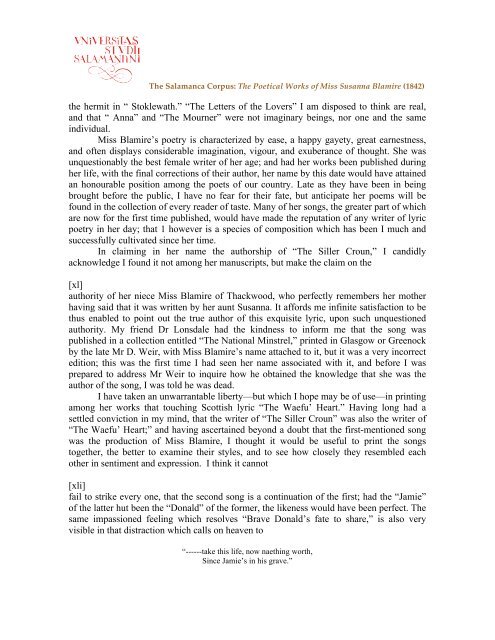The Poetical Works of Miss Susanna Blamire (1842) - Gredos ...
The Poetical Works of Miss Susanna Blamire (1842) - Gredos ...
The Poetical Works of Miss Susanna Blamire (1842) - Gredos ...
Create successful ePaper yourself
Turn your PDF publications into a flip-book with our unique Google optimized e-Paper software.
<strong>The</strong> Salamanca Corpus: <strong>The</strong> <strong>Poetical</strong> <strong>Works</strong> <strong>of</strong> <strong>Miss</strong> <strong>Susanna</strong> <strong>Blamire</strong> (<strong>1842</strong>)<br />
the hermit in “ Stoklewath.” “<strong>The</strong> Letters <strong>of</strong> the Lovers” I am disposed to think are real,<br />
and that “ Anna” and “<strong>The</strong> Mourner” were not imaginary beings, nor one and the same<br />
individual.<br />
<strong>Miss</strong> <strong>Blamire</strong>’s poetry is characterized by ease, a happy gayety, great earnestness,<br />
and <strong>of</strong>ten displays considerable imagination, vigour, and exuberance <strong>of</strong> thought. She was<br />
unquestionably the best female writer <strong>of</strong> her age; and had her works been published during<br />
her life, with the final corrections <strong>of</strong> their author, her name by this date would have attained<br />
an honourable position among the poets <strong>of</strong> our country. Late as they have been in being<br />
brought before the public, I have no fear for their fate, but anticipate her poems will be<br />
found in the collection <strong>of</strong> every reader <strong>of</strong> taste. Many <strong>of</strong> her songs, the greater part <strong>of</strong> which<br />
are now for the first time published, would have made the reputation <strong>of</strong> any writer <strong>of</strong> lyric<br />
poetry in her day; that 1 however is a species <strong>of</strong> composition which has been I much and<br />
successfully cultivated since her time.<br />
In claiming in her name the authorship <strong>of</strong> “<strong>The</strong> Siller Croun,” I candidly<br />
acknowledge I found it not among her manuscripts, but make the claim on the<br />
[xl]<br />
authority <strong>of</strong> her niece <strong>Miss</strong> <strong>Blamire</strong> <strong>of</strong> Thackwood, who perfectly remembers her mother<br />
having said that it was written by her aunt <strong>Susanna</strong>. It affords me infinite satisfaction to be<br />
thus enabled to point out the true author <strong>of</strong> this exquisite lyric, upon such unquestioned<br />
authority. My friend Dr Lonsdale had the kindness to inform me that the song was<br />
published in a collection entitled “<strong>The</strong> National Minstrel,” printed in Glasgow or Greenock<br />
by the late Mr D. Weir, with <strong>Miss</strong> <strong>Blamire</strong>’s name attached to it, but it was a very incorrect<br />
edition; this was the first time I had seen her name associated with it, and before I was<br />
prepared to address Mr Weir to inquire how he obtained the knowledge that she was the<br />
author <strong>of</strong> the song, I was told he was dead.<br />
I have taken an unwarrantable liberty—but which I hope may be <strong>of</strong> use—in printing<br />
among her works that touching Scottish lyric “<strong>The</strong> Waefu’ Heart.” Having long had a<br />
settled conviction in my mind, that the writer <strong>of</strong> “<strong>The</strong> Siller Croun” was also the writer <strong>of</strong><br />
“<strong>The</strong> Waefu’ Heart;” and having ascertained beyond a doubt that the first-mentioned song<br />
was the production <strong>of</strong> <strong>Miss</strong> <strong>Blamire</strong>, I thought it would be useful to print the songs<br />
together, the better to examine their styles, and to see how closely they resembled each<br />
other in sentiment and expression. I think it cannot<br />
[xli]<br />
fail to strike every one, that the second song is a continuation <strong>of</strong> the first; had the “Jamie”<br />
<strong>of</strong> the latter hut been the “Donald” <strong>of</strong> the former, the likeness would have been perfect. <strong>The</strong><br />
same impassioned feeling which resolves “Brave Donald’s fate to share,” is also very<br />
visible in that distraction which calls on heaven to<br />
“------take this life, now naething worth,<br />
Since Jamie’s in his grave.”
















